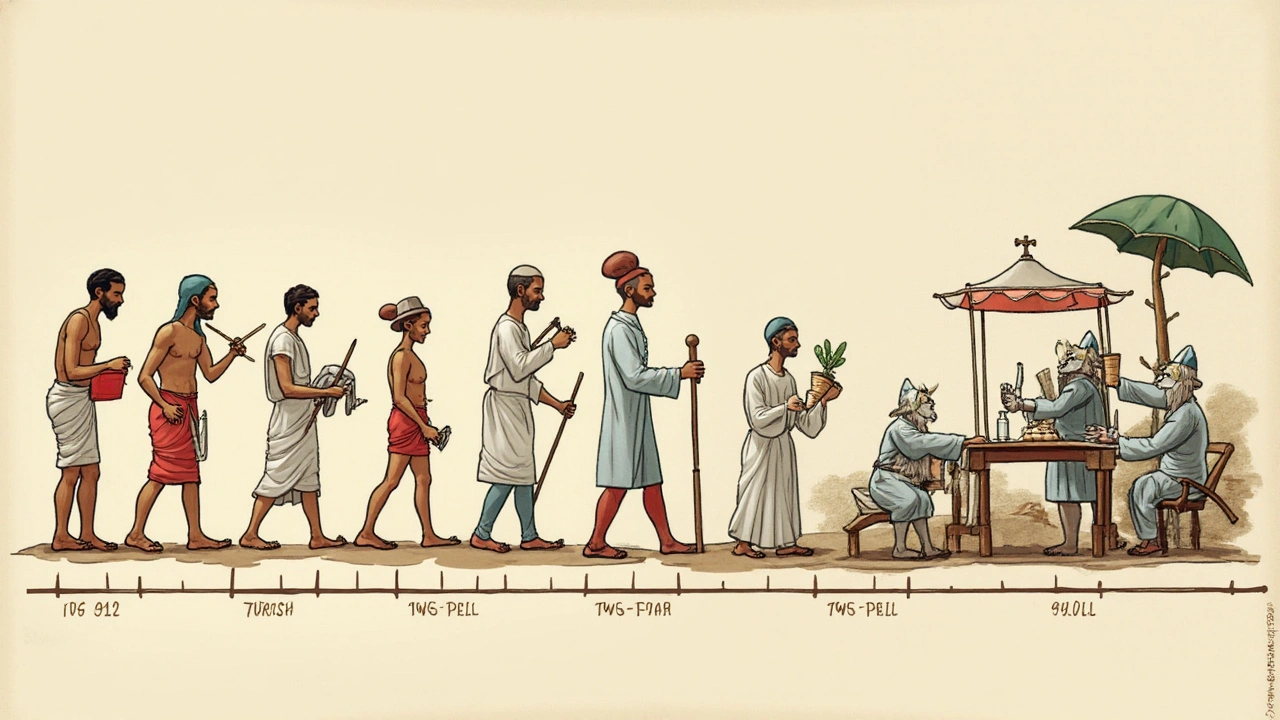When we think of ancient medicine, we often picture herbs and plants that have been lost to history. But some, like squill, have traveled through time to remain relevant even today.
Used for thousands of years, squill, a plant native to the Mediterranean region, has a storied past. Its bulbs were cherished by ancient healers for their purported health benefits. As the centuries rolled on, the knowledge of squill's properties spread and evolved, influencing various cultures and medicinal practices.
In this article, let's uncover the fascinating journey of squill. We'll explore how this intriguing plant was employed by ancient civilizations, the medicinal benefits it offers, its modern-day applications, and practical tips on how to include squill in your wellness routine. It's a story of survival, adaptation, and enduring relevance in the world of health.
- Origins and Early Uses
- Squill in Ancient Civilizations
- Medicinal Properties and Benefits
- Modern Applications and Supplements
- Incorporating Squill into Your Daily Life
Squill in Ancient Civilizations
Our journey into squill's past takes us to the heart of ancient civilizations. The Egyptians, Greeks, and Romans were among the first to recognize the medicinal properties of this resilient plant. Historical records indicate that Egyptian healers used squill to treat edema and other ailments. It was often included in their extensive lists of medicinal herbs, found inscribed on papyrus scrolls dating back to 1550 BCE.
The Greeks, too, held squill in high esteem. Hippocrates, often dubbed the 'Father of Medicine,' made notable references to squill in his medical writings. He prescribed it for various conditions ranging from respiratory issues to digestive disorders. The plant's bitter taste and powerful effects made it a reliable component in Greek pharmacopeia.
The Romans didn't lag behind. Pliny the Elder, a renowned Roman naturalist, documented numerous uses for squill in his encyclopedic work, 'Natural History.' According to Pliny, squill could be employed to combat a range of maladies, including dropsy, a condition characterized by severe fluid retention. Roman soldiers carried squill as part of their standard medical kits, a testament to its perceived importance.
The versatility and efficacy of squill are further underscored by its use in magic and folklore. In Mesopotamia, squill was considered a protective talisman. Amulets containing squill bulbs were believed to ward off evil spirits and bring good luck. This idea of combining medicinal plants with spiritual beliefs was a common thread across many ancient cultures.
"Squill holds a place not merely in the annals of medicine but also within the rich tapestry of human belief and superstition," writes historian Dr. Eleanor Franklin.
Apart from its therapeutic uses, squill was integral to ancient trade routes. Its bulbs, once dried and processed, were valuable commodities. Merchants transported them to different corners of the known world. The exchange of such goods facilitated cross-cultural exchanges of medical knowledge and practices, enriching each civilization's pharmacological repertoire.
Including squill into historical medical practices involved intricate preparations. Healers would often dry and grind the bulbs into powder, which could be mixed with wine or honey to mask the bitter taste. These concoctions were then administered as drinks or topical applications, depending on the ailment. The meticulous nature of these preparations reflects the deep-rooted trust and expertise developed over generations.
So, as you can see, the use of squill in ancient civilizations was both widespread and multifaceted. Its transition from a mystical plant to a highly regarded medicinal herb paved the way for its enduring presence in modern health practices. Understanding this fascinating history enriches our appreciation for squill and its ongoing relevance as a herbal supplement today.

Medicinal Properties and Benefits
Squill, known scientifically as Drimia maritima, is a plant with a long history of use in traditional medicine. Its bulbs contain a variety of bioactive compounds that have intrigued scientists for decades. The most notable of these compounds are cardiac glycosides, which have a significant impact on heart health.
The ancient Greeks and Egyptians were among the first to document the use of squill for its healing properties. Hippocrates, often referred to as the father of medicine, mentioned squill as a treatment for heart ailments. He wasn't alone in this regard. Ancient Egyptian medical texts describe using squill as a remedy for various conditions, ranging from edema to heart failure.
Modern science has validated many of these ancient claims. Cardiac glycosides in squill have been shown to strengthen the heart muscle, making it a valuable treatment for heart failure and other cardiovascular issues. These compounds work by increasing the contractility of the heart, thereby improving cardiac output. This makes squill a natural remedy worth considering for those with heart conditions.
Apart from cardiac benefits, squill also exhibits anti-inflammatory and diuretic properties. Studies have indicated that squill extracts can help reduce inflammation, making it beneficial for conditions like arthritis. The diuretic effect helps eliminate excess fluids from the body, which can be particularly useful for those suffering from edema or high blood pressure.
Interestingly, squill has also been studied for its potential anti-cancer properties. Preliminary research suggests that certain compounds in the plant may inhibit the growth of cancer cells. While these findings are promising, more research is needed to fully understand the scope of squill's anti-cancer capabilities.
The versatility of squill doesn't end there. Its bulbs have been used in traditional medicine for treating respiratory issues such as asthma and chronic bronchitis. The expectorant properties of squill help clear mucus from the respiratory tract, making it easier to breathe.
According to a study published in the Journal of Ethnopharmacology, "Squill has shown effectiveness in a variety of health conditions ranging from cardiovascular diseases to respiratory ailments."
In summary, the medicinal properties of squill are diverse and well-documented. From heart health to anti-inflammatory benefits, this ancient plant offers a range of therapeutic applications that have stood the test of time. Its journey from the medicinal texts of ancient civilizations to modern health supplements is a testament to its enduring value.

Modern Applications and Supplements
Fast forward to today, and the use of squill has evolved in captivating ways. Modern science has confirmed some of the health benefits that ancient practitioners believed squill possessed. This has led to the creation of diverse supplements aimed at improving various health aspects from heart health to respiratory support.
One of the most popular modern applications of squill is in treating heart conditions. Squill contains compounds called cardiac glycosides, which have been shown to help improve heart function. These compounds can increase the force of heart contractions, making it more efficient and, as a result, beneficial for patients with conditions like heart failure. Squill is often compared to digitalis, another plant with similar heart-related benefits.
Today, you can find squill in various forms, including tablets, tinctures, and powders. These supplements are often formulated to optimize the bioavailability of saponins and cardiac glycosides—the key active compounds. This means that the body can absorb and utilize these beneficial components effectively. Many users report noticeable improvements in their energy levels and overall well-being when they incorporate squill supplements into their daily routine.
If you want to learn more about how herbs like squill have shaped modern medicine, read "The Green Pharmacy" by James A. Duke, a comprehensive guide to the therapeutic uses of various plants.
Squill is also making waves in respiratory health. Traditionally, squill was used as a natural remedy for coughs and asthma. This use has persisted into the modern era, with squill extracts now included in some over-the-counter cough syrups and expectorants. The plant’s bronchodilatory effects can help ease respiratory discomfort, making it easier to breathe for individuals suffering from asthmatic conditions.
Practical Tips for Taking Squill Supplements
To make the most out of squill supplements, consider the following tips:
- Always consult with a healthcare provider before starting any new supplement, especially if you have existing health conditions or take other medications.
- Start with a low dose to assess your tolerance, then gradually increase as needed.
- Read product labels carefully to ensure you're getting a high-quality supplement with no unnecessary additives or fillers.
- Monitor any changes in your health, both positive and negative, when you start taking squill supplements. Keeping a journal can be helpful.
Squill history illustrates a captivating journey from ancient medicine to present-day health supplement. Its diverse applications today, particularly in the realms of heart and respiratory health, show how ancient knowledge continues to benefit us even in the modern era. Whether you look to squill for its cardiac benefits or its respiratory support, this remarkable plant holds a special place in the world of modern health supplements.

Incorporating Squill into Your Daily Life
Adding squill to your daily routine can be both simple and beneficial. This ancient plant has made a name for itself in the health community, thanks to its medicinal properties that have been recognized for centuries. If you're curious about making squill a part of your wellness regimen, there are several ways to do it.
One straightforward approach is taking squill supplements. These are available in most health food stores in capsule or tablet form. The dosage varies depending on the product, so it's wise to follow the instructions on the label. Consulting a healthcare provider before starting any new supplement, including squill, is always a good idea. They can provide personalized advice based on your health needs.
For those who prefer natural remedies, using dried squill bulbs to make tea is an option. This method harks back to ancient practices where squill was used in its most natural form. To make squill tea, simply steep a small piece of the dried bulb in hot water for 10-15 minutes. You can add honey or lemon for extra flavor.
Adding squill to your cooking is another interesting way to reap its benefits. Some people sprinkle powdered squill on their meals as a spice. It's important to use it sparingly due to its potent nature. A little goes a long way in enhancing not just the flavor but also the nutritional value of your dishes.
Traditional tinctures made from squill are yet another option. These tinctures are often alcohol-based and can be found in herbal stores. They are concentrated, so a few drops in water or juice are usually enough. Again, seek advice from a healthcare provider to ensure this method is suitable for you.
If you enjoy gardening, growing your own squill might appeal to you. This hardy plant thrives in Mediterranean climates and requires minimal care. Having fresh squill on hand means you can use it in various forms more readily. Remember, fresh squill can be quite strong, so it's best used in small amounts.
"Squill has been a part of our herbal medicine cabinet for years, offering various health benefits from cardiovascular support to easing respiratory conditions," says Dr. Amelia Stone, a renowned herbalist.
It's essential to note that while squill has many benefits, it's also important to use it responsibly. Overconsumption can lead to adverse effects like nausea or digestive upset. Always start with small doses to see how your body reacts.
Squill is truly a versatile plant with a rich history and modern applications. Whether you choose supplements, teas, tinctures, or cooking, there are multiple ways to incorporate this ancient remedy into your daily life. By doing so, you can enjoy its health benefits while connecting with a time-honored tradition.


Mason Grandusky
September 20, 2024 AT 16:42Wow, reading about squill feels like stepping into a time machine that lands straight in a modern pharmacy.
I’ve been hunting for herbs that can give my heart a gentle boost without the synthetic buzz, and squill shows up right on that radar.
The ancient Greeks weren’t just mystics; they actually nailed the cardio‑glycoside action that researchers are confirming today.
What blows my mind is that you can find squill capsules on the same shelf as your multivitamins, bridging millennia in a single bottle.
If you’re looking for a natural diuretic, a few milligrams of squill extract can help flush excess fluid, which is a game‑changer for those battling edema.
I tried the powdered version in my morning smoothie and felt a subtle surge of energy that lasted through my afternoon workout.
The taste is bitter, sure, but mixing it with a splash of orange juice masks the flavor while keeping the potency intact.
From a historical angle, it’s fascinating that Roman soldiers carried squill in their kits, trusting it to keep them battle‑ready.
That legacy gives us confidence that the plant has survived rigorous testing long before modern labs existed.
In addition to heart support, squill’s anti‑inflammatory compounds can soothe joint aches, which is a sweet bonus for anyone who hits the gym hard.
Researchers are also poking around its potential anti‑cancer pathways, hinting that this humble bulb might have even deeper tricks up its sleeve.
So when you think about adding a new supplement, consider squill as a multi‑tasker that respects both tradition and science.
Just remember to start low, watch how your body reacts, and keep a journal – the ancient healers would approve of that meticulous approach.
And if you enjoy growing herbs, planting squill in a sunny spot can give you fresh bulbs for teas and home‑brew tinctures.
All in all, squill is a vivid example of how old‑world wisdom can thrive in 21st‑century wellness routines.
Spencer Riner
September 20, 2024 AT 18:33That energy is infectious! I’ve been digging into the safety profile and it turns out the therapeutic window for squill is pretty narrow, so it’s vital to honor the dosage recommendations on the label.
Most reputable brands stick to a standardized extract that balances the cardiac glycosides, which tames the risk of overstimulation.
Pairing a low starting dose with a steady log of how you feel can reveal the sweet spot for your individual physiology.
And if you ever feel a fluttery heartbeat or nausea, that’s a clear sign to pause and reassess.
Joe Murrey
September 20, 2024 AT 20:46i gotta say, the cultural journey of squill is kinda wild.
back in the day, folks used it not just as medicine but also as a talisman to keep bad vibes away.
its bitter flavor made it a tough love ingredient, so people would mix it with honey or wine to make it go down smoother.
today, you still see it popping up in some Mediterranean kitchens, adding a subtle earthy note to stews.
just remember, a lil’ goes a long way – overdoing it can mess with your stomach.
Tracy Harris
September 20, 2024 AT 22:43While the anecdotal allure of squill is undeniably captivating, rigorous scientific scrutiny remains paramount.
Current peer‑reviewed literature confirms the presence of cardiac glycosides, yet underscores the necessity for controlled dosing to avert potential cardiotoxicity.
It is incumbent upon practitioners to reference pharmaco‑dynamic studies and adhere to evidence‑based protocols when recommending squill to patients.
Moreover, the historical applications, though rich, should not eclipse the imperative for modern clinical validation.
In sum, squill offers promising therapeutic avenues, provided its integration into contemporary regimens is guided by meticulous research and professional oversight.
Sorcha Knight
September 21, 2024 AT 00:40Honestly, the hype is overrated 🙄